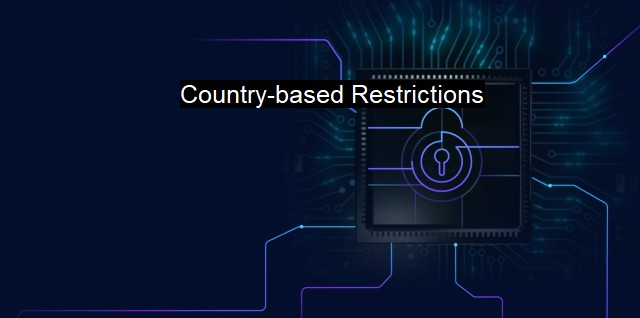What are Country-based Restrictions?
Mitigating Cybersecurity Threats through Country-Based Restrictions: Safeguarding Networks Against Hackers and Espionage Attempts
Country-based restrictions refer to the practice of limiting or restricting cyber resources and services based on geographical considerations or a user’s physical location. It has gained considerable attention in recent years because of its controversial nature and the implication it poses to global accessibility and information symmetry.What warrants emphasis is the role that country-based restrictions play in the realm of cybersecurity. Primarily, country-based restrictions are viewed as a mechanism to secure intellectual property (IP), restrict unwanted access, and minimize the exposure to specific cyber threats prevalent in certain geographical locations. The nature, frequency and severity of cyber threats can significantly vary based on the geographical location. Hence, country-based restrictions can better-enable organizations and entities to tailor their cybersecurity strategies focused on active threats.
Just as various countries have unique risks such as infectious diseases and political instability that warrant travel advisories, the cyber world also has its equivalent. Certain countries are notorious for malicious cyber activities including state-sponsored cyber attacks. Entities who identify such locations as potentially harmful can leverage country-based restrictions to prevent threats originating from these regions.
Further, in the fight against cyber threats, antivirus software developers often use country-based restrictions. For instance, if a country is known to harbor hackers who constantly work against a certain antivirus software, limiting access or more sophisticated monitoring mechanisms may be implemented for downloads or use of the service in those respective countries.
Country-based restrictions don’t just protect against threats; they also play a significant role in maintaining compliance with international laws and licensing agreements. Cybersecurity companies often face stringent regulations that necessitate limiting their products and services to specific regions to avoid conflict with regional policies or licensing protocols, reducing legal risks.
While country-based restrictions offer potential cybersecurity benefits, it’s essential to acknowledge the challenges and issues they present. A major criticism involves the violation of the principle of free and open Internet. Restrictions can prohibit users from certain nations from accessing certain information or resources, creating an information asymmetry. It doesn't foster the spirit of the internet being a global platform for knowledge sharing.
Country-based restrictions can also disproportionately affect innocent individuals using the internet for legitimate purposes—creating a form of digital discrimination. While the intent may be to thwart malicious entities, broad country-based restrictions can inadvertently block regular users from access.
Adept cybercriminals can circumvent these restrictions. A VPN or proxy enables them to simulate an online presence in an unrestricted country, thereby neutralizing the effectiveness of country-based sanctions.
Country-based restrictions serve to enhance cybersecurity and abide by global compliance requirements. They empower organizations to construct an effective barrier against region-specific threats and secure their intellectual property.
Such restrictive practices can seemingly contravene the principles of a free, open and fair internet. They often cast a globally spanned net, which while catching a significant number of threats, may also trap unsuspecting, regular users trying to access their services, especially those in the targeted nations. It’s crucial for future discussions and legislation to consider these factors to strike a balance between security and freedom. Although regulating cyber activities is a daunting task, overcoming it is not impossible; we usually end up creating a system that achieves the desired security level while still embracing the free-spirited nature of the internet.

Country-based Restrictions FAQs
What are country-based restrictions when it comes to cybersecurity and antivirus?
Country-based restrictions refer to limitations placed on certain software, websites or online services in specific countries due to government regulations or security concerns. These restrictions may affect the availability, functionality, and accessibility of cybersecurity and antivirus products in those countries.Why do governments impose country-based restrictions on cybersecurity and antivirus products?
Governments impose country-based restrictions on cybersecurity and antivirus products to protect their citizens, critical infrastructure, and government agencies from potential cyber threats. These restrictions also help in controlling the flow of sensitive information and preventing cyber espionage by foreign actors.Can I purchase and use cybersecurity and antivirus products that are restricted in my country?
It is not advisable to purchase or use cybersecurity and antivirus products that are restricted in your country, as it may violate local laws and regulations, and potentially put you at risk of cyber attacks or legal action. Always check local laws and regulations before using any cybersecurity or antivirus products.How can I find out if a cybersecurity or antivirus product is restricted in my country?
To find out if a cybersecurity or antivirus product is restricted in your country, you can check with your local government agencies responsible for regulating cybersecurity or internet services. You can also contact the software vendor or service provider directly to inquire about any country-based restrictions that may apply to their product.| | A | | | B | | | C | | | D | | | E | | | F | | | G | | | H | | | I | | | J | | | K | | | L | | | M | |
| | N | | | O | | | P | | | Q | | | R | | | S | | | T | | | U | | | V | | | W | | | X | | | Y | | | Z | |
| | 1 | | | 2 | | | 3 | | | 4 | | | 7 | | | 8 | | |||||||